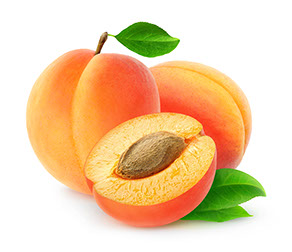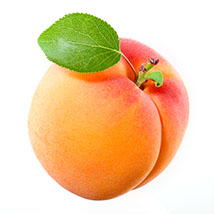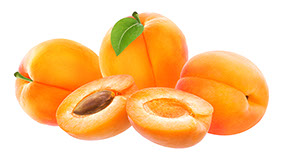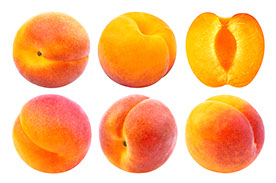Overview
Compatibility & Temperature
Grade Tolerances
Nutrition Information
Apricots
Apricots are those beautifully orange colored fruits full of beta-carotene and fiber that are one of the first signs of summer. Although dried and canned apricots are available year-round, fresh apricots with a plentiful supply of vitamin C and are in season in North America from May through August. Any fresh fruit you see during the winter months have been imported from either South America or New Zealand.
Relatives to peaches, apricots are small, golden orange fruits, with velvety skin and flesh, not too juicy but definitely smooth and sweet. Some describe their flavor as almost musky, with a faint tartness that lies somewhere between a peach and a plum.


Compatibility
Group 1. Ice contact not recommended. Ethylene producer.
Temperature
USDA recommended storage 32° . (0° C.)
Approximate freezing point 31.1° F. (-1.1° C.)
Temperature management is extremely important, as even under ideal conditions, apricots rarely have a shelf life longer than one to two weeks. Temperatures should be maintained between 32° and 36° F. to retard the ripening process and to discourage the development of disease organisms
Since apricots are transported and stored at temperatures near freezing, apricots affected by freezing and frozen conditions are sometimes seen in the market place. It should be pointed out that apricots generally do not freeze until temperatures dip down near 29° F.
Fruit which has been subjected to freezing temperatures will be water soaked and translucent in appearance. If temperatures are allowed to drop far enough and long enough, ice crystals will form in the tissue rupturing the fruit’s cells. These ruptured tissues will then collapse, turn brown, and become soft and mushy.

Summary of Published Grade Standard Tolerances
(The following pertains to U.S. No. 1 unless otherwise noted.)
For defects
10% total including
5% serious including
1% decay or internal breakdown
For offsize
10% under the size designated
Quality Defects
1) Maturity
2) Shape
3) Red Blush Color
4) Old Worm Holes
5) Healed Cuts and Skin Breaks
6) Growth Cracks
7) Limb Rubs
8) Russeting
Condition Defects
1) Firmness
2) Ground Color
3) Bruising
4) Storage Injury
5) Alternaria Rot
6) Bacterial Spot
7) Blue Mold Rot
8) Brown Rot
9) Gray Mold Rot
Remarks: Sizes are not specified by grade. When numerical count is used, apricots in any container shall not vary more than 1/4 inch
in diameter.
Suitable Shipping Condition/ F.O.B. Good Delivery Guidelines
(Maximum percentage for 5 day normal transit.)
15% total including
8% serious including
3% decay
Nutrition Facts
Serving Size 1 apricot
Amount Per Serving
Calories from Fat 1Calories 17
% Daily Values*
Total Fat 0.14g 0%
Saturated Fat 0.009g 0%
Polyunsaturated Fat 0.027g
Monounsaturated Fat 0.06g
Cholesterol 0mg 0%
Sodium 0mg 0%
Potassium 91mg
Total Carbohydrate 3.89g 1%
Dietary Fiber 0.7g 3%
Sugars 3.23g
Protein 0.49g
Vitamin A 13% Vitamin C 6%
Calcium 0% Iron 1%
* Percent Daily Values are based on a 2000 calorie diet. Your daily values may be higher or lower depending on your calorie needs.
Nutrition Values are based on USDA Nutrient Database SR18


Century Farms International, Inc.
10957 NW 123rd Street Medley, FL 33178
Office: 305-436-7971 Fax: 305-436-7968



